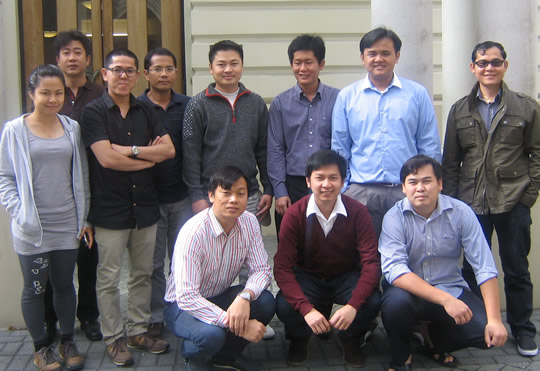Master's study making a difference in South-East Asia
South-East Asian is a fast-growing region whose nations aim to take their place in the modern world alongside more developed countries, and evidence of this is to be found in a group of students currently studying for their Master’s degrees at the School of Government.

For many, South-East Asia is an exotic tourist destination that conjures up images of ancient temples, delicious food and dazzling beaches. However, it's also a fast-growing region whose nations aim to take their place in the modern world alongside more developed countries.
Evidence of this is to be found in a group of South-East Asian students currently studying for their Master’s degrees at the School of Government.
Sim Pech Chetra
Sim Pech Chetra chose to study for a Master of Public Policy at the School because no institution in Cambodia offered a similar qualification.
"The School's location in Wellington, the capital city, was also an attraction – it’s a good place to learn about public policy."
Pech Chetra says he has found the courses he has done interesting and relevant.
"I especially liked the comparative public management course, because it explores different public management and governance systems in developed and developing countries."
He would like to use the knowledge he has gained to make a career in the public sector, possibly as an advisor on education policy.
"The problem in my country is that too few talented people go into the public service – we need more skills and knowledge there."
E sophea
One of the group's senior members is E Sophea, who has taken time out from his job as Under-Secretary of State in Cambodia’s Ministry of Posts and Telecommunications to study for the School's new Master of e-Government.
"I looked around various university websites and liked the look of the e-government courses run by the School of Government," he says.
Sophea says he has found his teachers encouraging and helpful, as "they readily answer any questions I have, and they’re experts in the area of e-government".
When he gets back to Cambodia, Sophea wants to look at how ICT can be used to improve public services in his country.
"Most public sector agencies in Cambodia are still paper-bound institutions. The majority of people have mobile phones, and due to the availability of the Internet social media sites like Facebook are popular. However, ICT use in government is comparatively under-developed.
"More, and better, use of ICT can help us do things like increase access to public services and build good governance."
Lim Vatha
Lim Vatha was attracted to the idea of studying for a Master of Public Policy at the School because he is interested in furthering administrative reform in Cambodia.
"The Prime Minister, Hun Sen, has proclaimed the need for administrative reform in Cambodia," he says. "We need to build good governance at a sub-national and national level to improve transparency and accountability."
Vatha says he is pleased with his Master’s programme.
"I can chose the courses I like and which I consider will be useful to me. Most importantly, I have to study independently and do my own research – this is very different from the situation at home, where there tends to be more rote learning.
"The facilities here are excellent, too. In Cambodia, by contrast, things like libraries are often poorly stocked."
When he returns home, Vatha wants to work for an NGO or donor agency to help in the process of administrative reform.
"At the moment, too often government officials are accountable to political parties rather than to citizens," he says. "I want to see that change."
